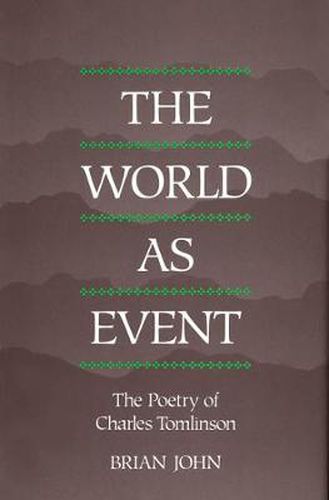Readings Newsletter
Become a Readings Member to make your shopping experience even easier.
Sign in or sign up for free!
You’re not far away from qualifying for FREE standard shipping within Australia
You’ve qualified for FREE standard shipping within Australia
The cart is loading…






In 1962, when asked whether it was a good or bad period for writing poetry, Robert Graves replied, not unreasonably, ‘there’s nothing wrong with the period, but where are the poets?’ – from the introduction to The World as Event. Brian John suggests that the work of Charles Tomlinson should be granted equal prominence. Tomlinson, never an imitator, has remained isolated from groups and uninfluenced by movements. Although his reputation as a major contemporary British poet was established early in the United States, his work met with little notice in Great Britain. Even now, he is more accepted and appreciated outside his homeland. Tomlinson suffers, as did Keats and Tennyson, from the accusation that his poetry is essentially un-British. Brian John observes in his introduction that Wherever he has sought enrichment of his art, however, Tomlinson has remained intrinsically an English poet, intent upon re-awakening English sensibilities to the real nature of the world. ‘I write as an Englishman who has responded to other horizons,’ he declared in 1987, ‘internationally minded, though with the ballast of England and English to keep him – Wordsworth’s favourite word – steady.’
John presents a perceptive view of Tomlinson’s work, giving attention to the meaning of his poetry and tracing the sources of both his literary and philosophical thinking.
$9.00 standard shipping within Australia
FREE standard shipping within Australia for orders over $100.00
Express & International shipping calculated at checkout
In 1962, when asked whether it was a good or bad period for writing poetry, Robert Graves replied, not unreasonably, ‘there’s nothing wrong with the period, but where are the poets?’ – from the introduction to The World as Event. Brian John suggests that the work of Charles Tomlinson should be granted equal prominence. Tomlinson, never an imitator, has remained isolated from groups and uninfluenced by movements. Although his reputation as a major contemporary British poet was established early in the United States, his work met with little notice in Great Britain. Even now, he is more accepted and appreciated outside his homeland. Tomlinson suffers, as did Keats and Tennyson, from the accusation that his poetry is essentially un-British. Brian John observes in his introduction that Wherever he has sought enrichment of his art, however, Tomlinson has remained intrinsically an English poet, intent upon re-awakening English sensibilities to the real nature of the world. ‘I write as an Englishman who has responded to other horizons,’ he declared in 1987, ‘internationally minded, though with the ballast of England and English to keep him – Wordsworth’s favourite word – steady.’
John presents a perceptive view of Tomlinson’s work, giving attention to the meaning of his poetry and tracing the sources of both his literary and philosophical thinking.